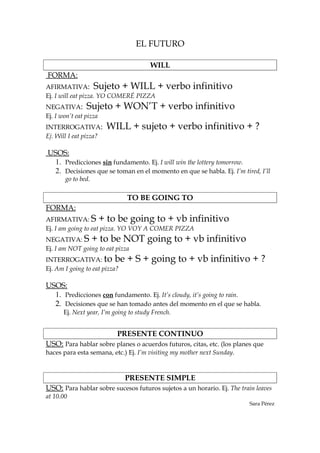
El futuro
- 1. EL FUTURO WILL FORMA: AFIRMATIVA: Sujeto + WILL + verbo infinitivo Ej. I will eat pizza. YO COMERÉ PIZZA NEGATIVA: Sujeto + WON’T + verbo infinitivo Ej. I won’t eat pizza INTERROGATIVA: WILL + sujeto + verbo infinitivo + ? Ej. Will I eat pizza? USOS: 1. Predicciones sin fundamento. Ej. I will win the lottery tomorrow. 2. Decisiones que se toman en el momento en que se habla. Ej. I’m tired, I’ll go to bed. TO BE GOING TO FORMA: AFIRMATIVA: S + to be going to + vb infinitivo Ej. I am going to eat pizza. YO VOY A COMER PIZZA NEGATIVA: S + to be NOT going to + vb infinitivo Ej. I am NOT going to eat pizza INTERROGATIVA: to be + S + going to + vb infinitivo + ? Ej. Am I going to eat pizza? USOS: 1. Predicciones con fundamento. Ej. It’s cloudy, it’s going to rain. 2. Decisiones que se han tomado antes del momento en el que se habla. Ej. Next year, I’m going to study French. PRESENTE CONTINUO USO: Para hablar sobre planes o acuerdos futuros, citas, etc. (los planes que haces para esta semana, etc.) Ej. I’m visiting my mother next Sunday. PRESENTE SIMPLE USO: Para hablar sobre sucesos futuros sujetos a un horario. Ej. The train leaves at 10.00 Sara Pérez
- 2. FUTURO CONTINUO FORMA: AFIRMATIVA: S + WILL BE + vb ING Ej. I will be eating pizza. YO ESTARÉ COMIENDO PIZZA NEGATIVA: S + WON’T BE + vb ING Ej. I won’t be eating pizza INTERROGATIVA: WILL + S + BE + vb ING + ? Ej. Will I be eating pizza? USO: Para indicar que una acción se estará desarrollando en un momento concreto del futuro. Ej. I will be working all day tomorrow / This time next week I’ll be visiting Paris. FUTURO PERFECTO FORMA: AFIRMATIVA: S + WILL HAVE + vb (participio) Ej. I will have eaten pizza. YO HABRÉ COMIDO PIZZA. NEGATIVA: S + WON’T HAVE + vb (participio) Ej. I won’t have eaten pizza INTERROGATIVA: WILL + S + HAVE + vb(participio) + ? Ej. Will I have eaten pizza? USO: Para indicar que una acción ya habrá acabado en un momento concreto del futuro. Ej. By next year I’ll have left university / By the time you arrive, I will have gone Sara Pérez